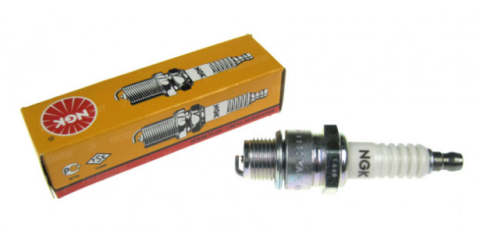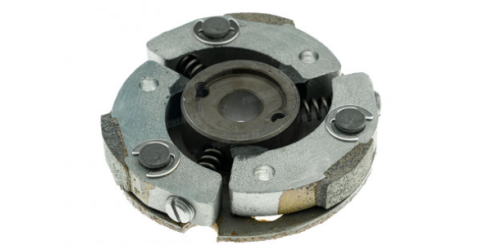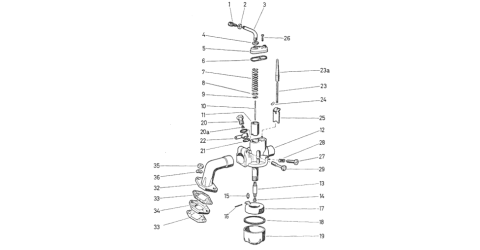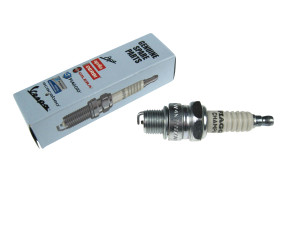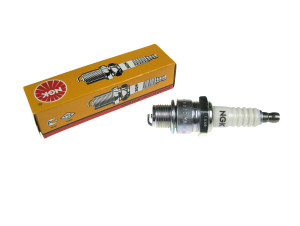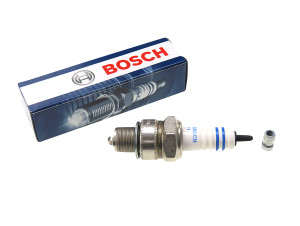NGK, Bosch and Champion spark plugs can be used for multiple set ups, ranging from a 38mm cylinder (40km/h) to a 74cc set up. An iridium spark plug is often chosen for heavy-duty use, for example for race, cross or sprint target ends.
| Brand spark plug | Type | Heat rate | Shaft size | Application |
| NGK | B5HS | 5 | short |
Snorfiets / 50cc / 25 km/h |
| NGK | B6HS | 6 | short |
Bromfiets / 50cc / 40 km/h |
| NGK | B7HS | 7 | short |
Bromfiets / 50cc / 6-poorts |
| NGK | B8HS | 8 | short |
Bromfiets / 65cc & 70cc |
| NGK | B9HS | 9 | short |
Bromfiets / 70cc & 70cc tuned |
| NGK | B6ES | 6 | long |
Bromfiets / 50cc / 40 km/h |
| NGK | B7ES | 7 | long |
Bromfiets / 50cc / 6-poorts |
| NGK | B8ES | 8 | long |
Bromfiets / 65cc & 70cc |
| NGK | B9ES | 9 | long |
Bromfiets / 70cc & 70cc tuned |
| NGK | B10ES | 10 | long |
Bromfiets / 70cc & 74cc |
| NGK | BR8ES | 8 | long |
Bromfiets / 65cc & 70cc |
| NGK | CR7HSA | 7 | short | Bromfiets / 50cc / 6-poorts |
| NGK | BR8HIX | 8 | short |
Bromfiets / 65cc & 70cc |
| NGK | BR9HIX | 9 | short |
Bromfiets / 70cc & 70cc tuned |
| NGK | BR10HIX | 10 | short |
Bromfiets / 70cc & 74cc |
| NGK | BR8EIX | 8 | long |
Bromfiets / 65cc & 70cc |
| Brand spark plug |
Type | Heat rate |
Shaft size |
Application |
| Bosch | W4AC | 4 | short |
Bromfiets / 65cc & 70cc |
| Bosch | W5AC | 5 | short |
Bromfiets / 50cc / 6-poorts |
| Bosch | W6AC | 6 | short |
Bromfiets / 50cc / 40 km/h |
| Bosch | W7AC | 7 | short |
Bromfiets / 50cc / 40 km/h |
| Bosch | W8AC | 8 | short |
Snorfiets / 50cc / 25 km/h |
| Brand spark plug |
Type | Heat rate |
Shaft size |
Application |
| Champion | L86C | 7 | short |
Bromfiets / 50cc / 40 km/h |
| Champion | P82M | 8 | short |
Bromfiets / 65cc & 70cc |
Explanation short/long shaft:
The difference between short and long shank spark plugs is in the length of the thread on the spark plug.
- With a short shaft, this is: 14 millimetres (measured from the electrode to the ring)
- With a long shaft, this is: 19 millimetres (measured from the electrode to the ring)
So before ordering a new spark plug, check the size of the old spark plug. If you don't have an old spark plug, measure the depth of the hole in the cylinder head.
Explanation heat/heat degree Spark plug:
The heat rating is a measure of the thermal structure of a spark plug. This means that the heat degree indicates the spark plug's maximum heat load. So in theory, this means that the more power the moped produces, the higher the heat degree of the spark plug should be.
If the heat rating is too high (e.g. a rating of 9), the spark plug cannot dissipate the supplied heat fast enough. As a result, the mixture is not ignited by the ignition spark, but by an overheated spark plug.
If the heat rating is too low (for example 5), the spark plug does not function correctly at low revs , as a result the spark plug cannot clean itself. As a result: skipping, increasing fuel consumption and emissions.
Explanation electrode distance spark plug:
The electrode distance is the small distance between the spark plug electrode and the spark plug earth electrode, this is the distance where the spark should jump over. An incorrect distance can have nasty consequences on the moped's performance:
- Cause noisy idling and exhaust fumes of poor quality.
- If the electrode distance is too large, it may lead to engine stalling.
Explanation Spark plug designations:
The designations of different spark plugs consist of several characters/names. Below is an overview where these names are explained. The spark plug name is printed in bold, and below it the letters and numbers are explained.
NGK B5HS
- B indicates spark plug wire diameter, in this case 14 millimetres
- 5 indicates the heat degree, in this case 5
- H indicates thread length, in this case 12.7 millimetres (short shaft)
- S indicates spark plug type, in this case it is a standard type (without resistance)
NGK B6ES
- B indicates spark plug wire diameter, in this case 14 millimetres
- 6 indicates the heat degree, in this case 6
- E indicates thread length, in this case 12.7 millimetres (long shaft)
- S indicates spark plug type, in this case it is a standard type (without resistance)
NGK CR7HSA
- C indicates the diameter of the spark plug lead, in this case 10 millimeters.
- R indicates whether the spark plug has a suppression resistor, in this case the spark plug has a resistor.
- 7 indicates the heat degree, in this case 7
- H indicates thread length, in this case 12.7 millimetres (short shaft)
- S indicates the spark plug type, in this case it is a standard type
- A indicates the design of the spark plug, often related to dimensions
NGK BR10HIX
- B indicates spark plug wire diameter, in this case 14 millimetres
- R indicates whether the spark plug has a suppression resistor, in this case the spark plug has a resistor.
- 10 indicates the heat degree, in this case 10
- H indicates thread length, in this case 12.7 millimetres (short shaft)
- I indicates the spark plug type, in this case it is an iridium spark plug with a central electrode
- X this last digit indicates the electrode distance, in this case according to iridium specifications
Bosch W4AC
- W indicates the shape and size of the spark plug's thread, in this case M14 x 1.25 (standard moped size)
- 4 indicates the heat/heat degree for the spark plug, in this case 4. With Bosch spark plugs, the distribution is different from NGK spark plugs.
- A indicates the spark plug wire length, in this case short shank.
- C indicates the material of the electrode, in this case copper.
Difference in Spark plug caps:
There are several spark plug caps in the shop. Before ordering, make sure you order the right cap for your bike. The differences in the caps have to do with the resistance value of the cap. The resistance values of the caps in the shop range from 0 K Ohm to 5 K Ohm. The spark plug cap with a high resistance is used with a spark plug without resistance (see: overview spark plug names). The spark plug caps with a lower resistance are used with a spark plug with internal resistance (see: overview spark plug names). In the PVL analog ignition (Article number: 80051) there is a 5K Ohm resistor, therefore the PVL spark plug cap with 0K Ohm is used (Article number: 80064).
Mounting the spark plug
Installing the spark plug must be done correctly to avoid damaging the threads. The common size for the spark plugs for sale in the shop have a shaft diameter of 14 millimeters. Below is a table with the tightening torque in different cases:
| Spark plug type | Shaft diameter (mm)Cast | Cast iron cylinder (Nm) | Aluminium cylinder head (Nm) |
| Flat seating stand with ring |
18 | 34-44 | 34-44 |
| Flat seating stand with ring |
14 | 24-34 | 24-29 |
| Flat seating stand with ring |
12 | 15-24 | 15-20 |
| Flat seating stand with ring |
10 | 10-15 | 10-12 |
| Flat seating stand with ring |
8 | - | 8-10 |
If the spark plug is overtightened, it can damage the threads in the cylinder head and risk rendering the head unusable. However, if the spark plug is not tightened hard enough, it does not make sufficient contact with the cylinder head. This prevents the spark plug from dissipating heat.
Reading the spark plug (colors)
Reading the spark plug is important to learn more about the performance of the moped. After removing the spark plug, you can look at the color of the electrode (this is the part that sits in the cylinder head). Below is an overview of the different spark plug colors + explanation:
| Color | Possible cause | Possible consequence |
| Light color/white like |
Too lean mixture False air Wrong mixture Wrong heat rating Wrong mixture |
Holding back when accelerating Overheated engine Pinging of the engine Stalling/warming up of the engine |
| Light brown/brown |
Correct mixture Correct adjustment |
Good running of the engine |
| Dark brown/black |
Too rich mixture Wrong mixture Worn piston ring Worn cylinder |
Holding back on throttle Grease from the spark plug Excessive fuel consumption |
This is a rule of thumb for reading spark plug colors. Due to the change in current gasoline types and/or additives, the color can vary. Often with a newer type of gasoline (E5 or E 10) the color of the spark plug will be lighter.

